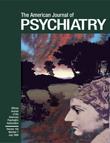Awareness of Illness and Subjective Experience of Cognitive Complaints in Patients With Bipolar I and Bipolar II Disorder
Abstract
OBJECTIVE: The authors’ goal was to investigate the awareness of illness and subjective cognitive complaints of patients with either bipolar I disorder or bipolar II disorder during a phase of clinical stabilization. METHOD: They used a structured clinical interview, the Frankfurt Complaints Questionnaire, to determine subjective cognitive complaints, and the Scale of Unawareness of Mental Disorder to assess 57 consecutively enrolled patients with bipolar I or bipolar II disorder. RESULTS: Patients with bipolar II disorder had significantly less insight and a higher level of subjective complaints of stimulus overload than patients with bipolar I disorder. CONCLUSIONS: These results suggest that a severe deficit in self-awareness may constitute a distinguishing psychopathological characteristic of patients with bipolar II disorder. Further studies are required to determine if there are associated neuropsychological dysfunctions.



